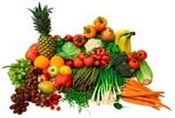Nutrients in fruits and vegetables start to break down after harvest. This loss of nutrients can be minimized by proper storage or processing. Frozen, canned, dried, and 100% juice products are processed just after harvesting to "lock in" the freshness of just-picked produce. Fresh fruits and vegetables are picked, packed, and distributed to stores very quickly so that you get the freshest items available. After purchase, proper storage and handling of fruits and vegetables will help retain nutrients.
Storing fruits and vegetables in the refrigerator will prolong their shelf life and slow down the spoilage process. It is best not to wash fruits or vegetables until you are ready to consume them to reduce spoilage and mold growth.
The three natural destroyers of vitamins in fruits and vegetables are heat, light, and oxygen. However, cooking and storing methods can help retain nutrients. Here's how:
- Limit storage time. Fresh is best when it comes to taste and nutrition.
- Store fruits and vegetables in the refrigerator to slow spoilage. However, tomatoes are an exception. Their flavor is destroyed in the refrigerator. Hold them at room temperature. If you want to store produce items for a longer time, consider freezing them.
- Cook minimally. Steam vegetables briefly until just crisp-tender. For example, asparagus and broccoli should retain their glorious bright green color. Water-soluble nutrients are destroyed with prolonged cooking time. If you do cook vegetables in water, those nutrients will leach into the cooking liquid, so try to use the cooking liquids in soups and stews.
- Avoid slicing vegetables too far in advance. When we slice into a vegetable or fruit, we expose the cut surfaces to heat, light, and oxygen — the nutrient destroyers. Better to wait to slice foods until we are ready to cook and eat them.







